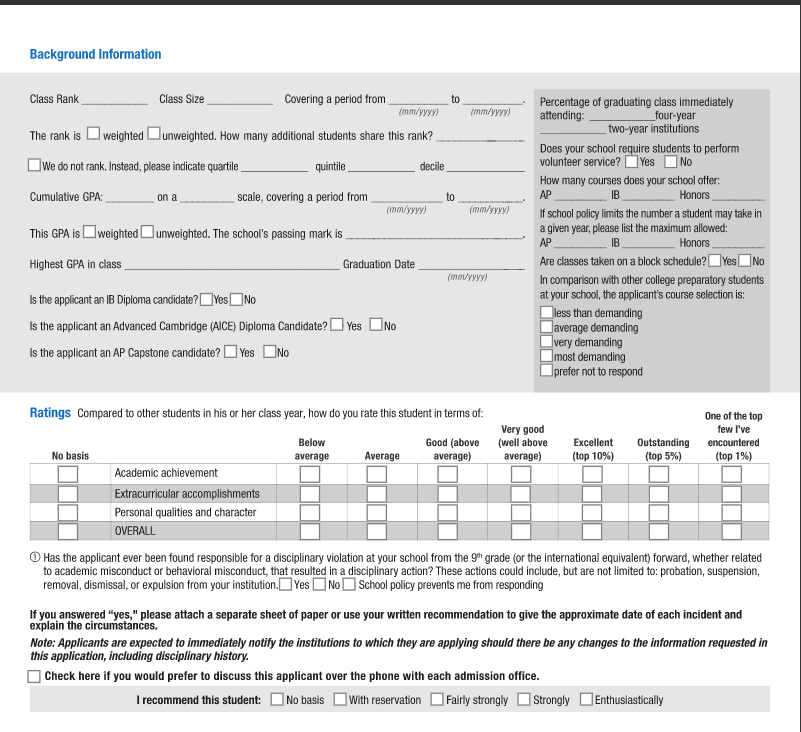Published September 10, 2020 | Last Updated March 31st, 2024 at 09:52 am

With so many schools going test-optional, how do test optional colleges evaluate a student’s readiness for college? What qualities does a school look for?
We did some research, and here’s what we learned about teacher and counselor recommendations and evaluations, and how the character of your student factors in.
The term “test-required” means that a school requires that the student take a test and submit their scores. The term “test-optional” means that it’s the student who decides whether they can and/or want to take the test and send their results to a specific school—the school doesn’t require it.
It might be a good choice for students who don’t test well, or are unable to prepare for standardized tests for any number of reasons—from financial to the inability to access the tests or testing sites.
Supporters of test-required say that colleges need a reliable way to compare students across the country—that the test is a screening device, a leveler of sorts to help schools make a first cut.
Those who would prefer to see the tests go away say that they are not a fair tool because they offer advantages to more privileged students.
Admissions officers determine a student’s readiness for college in a number of ways. In addition to those schools still requiring standardized tests, colleges look at GPA, letter grades, essays, recommendation letters, extracurricular activities, and evaluations that are filled out by teachers and counselors.
These vary by school and application type, including: The Common Application, The Coalition Application, and The Universal College Application.
In the absence of standardized tests, independent college consultant Nancy Griesemer says that in terms of how to evaluate students, there are indeed “challenges to overcome.”
The process of finding new ways to assess a student’s readiness for college is a work in progress.
Some schools are asking experts such as psychologists to come in and coach admissions counselors on how to read an application for clues to a student’s character—considered key to knowing how they will fare in college. Griesemer notes that this review process is actually more complicated than it might seem.
After all, she says, “How do you evaluate non-quantifiable character traits?”
The Common Application asks teachers and counselors to provide specific information that involves rating students on traits such as:
Most students are unaware that these kinds of questions are asked about them, because the forms are sent electronically to the teacher and counselor, then returned directly to the school.
The biggest challenge, though, may be that students don’t often know their teachers or counselors well—or, more precisely, their teachers and counselors don’t know them well . . . in large schools, or now, during the pandemic, when school is held remotely.
Griesemer says that trying to evaluate or attach some kind of grade or rank is very subjective.
Some teachers may even have a policy of never ranking a student higher than another, or they may interpret the boxes they need to check, as they relate to ranking, differently than the school the student is applying to.
And not all school counselors and teachers will complete the grids, since they are not required to do so. But these ratings can, she says, be a “useful shorthand for providing a rank order of sorts for students within a caseload.”
And colleges do take note of these rankings.
Griesemer is a member of the Character Collaborative, a volunteer organization of colleges, secondary schools, professional associations, research organizations, and individual counselors.
The goal of the group is to support the elevation of character attributes in admission. Griesemer regularly encourages students to become involved in activities that not only build character, but also show character. “I think character grows and evolves over time,” she says.
From the Character Collaborative website: “Character, as we use the term, refers to personal qualities such as resilience, perseverance, gratitude, ethical orientation, self-control, etc.
Research indicates that these ‘character strengths’ predict success in school, work and life. In a larger view, these qualities support a humane and civilized society.”
This “character movement”—the push to make a student’s personal qualities a more important part of the admissions process—is gaining adherents at schools across the country.
Angela Duckworth, the University of Pennsylvania professor known for her work on character or non-cognitive skills, is one of the movement’s leaders.
NPR reports that at a recent conference on the subject, she advised schools to determine what character skills they place the most value on and then judge students’ applications accordingly.
“Whatever you call them,” she said, “the take-home message is these things matter, and in some cases, matter as much as IQ.”
In the same story, NPR said that schools such as Swarthmore College, have already begun to look for students with “intellectual curiosity, for example, and creativity, generosity and problem-solving skills.”
But Jim Bock, the school’s vice president and dean of admissions, points out that so far their evaluations are based on more of a “feel” than anything else.“But how do you grade it?” he asks. “We struggle with that.”
For the time being, not all schools place as much emphasis on these hard-to-judge qualities in their evaluations.
To help provide a fuller picture of what some of the forms ask, we’ve included links here, along with screen shots of some of the highlights.
Keep in mind that individual colleges often have their own forms.






https://www.universalcollegeapp.com/documents/school-report.pdf

In the final analysis, Griesemer says that by becoming aware of the kinds of questions that counselors and teachers are asked to answer, your student can “be more aware of how factors other than tests and grades may influence decisions made by colleges.”
The sooner your student sees how they are evaluated, the sooner they can begin to shape their future—not only in their own eyes, but in the eyes of those who may be able to help them achieve their goals.
_______
Use R2C Insights to help find merit aid and schools that fit the criteria most important to your student. You’ll not only save precious time, but your student will avoid the heartache of applying to schools they aren’t likely to get into or can’t afford to attend.
Other Articles You Might Like:
Colleges Say They Want Passion, but What Does That Mean?
Showing Demonstrated Interest in a College Helps Prevent Being Labeled a “Stealth Applicant”
Parenting Dilemma: To Assist or Not to Assist in College Applications. Hear What Parents Have to Say
JOIN ONE OF OUR FACEBOOK GROUPS & CONNECT WITH OTHER PARENTS:

Dear Roadie, My excellent, motivated student wouldn’t let me anywhere near the application process. He insisted he had it handled,...

Students and families need to stay on track to find the right college at the right price, so we’re providing...

Each year, the CSS Profile unlocks over $10 billion in non-federal aid for students, complementing the FAFSA in securing crucial...
At Road2College you’ll find everything you need to make the admissions and paying for college process less stressful and more transparent.
Explore R2C Insights™ — your source for finding affordable colleges and merit scholarships.
Get coaching on admissions and college financing.
Join Road2College where parents and experts work together to inform and inspire college-bound families.
By Grade:
By Stage in the Process:
Ad Policy Disclaimer: Product name, logo, brands, and other trademarks featured or referred to within Road2College are the property of their respective trademark holders. Information obtained via Road2College™ is for educational purposes only. Please consult a licensed financial professional before making any financial decisions. This site may be compensated through third party advertisers. This site is not endorsed or affiliated with the U.S. Department of Education. By visiting Road2College’s site, you accept and agree to be bound by Road2College’s Terms of Use.